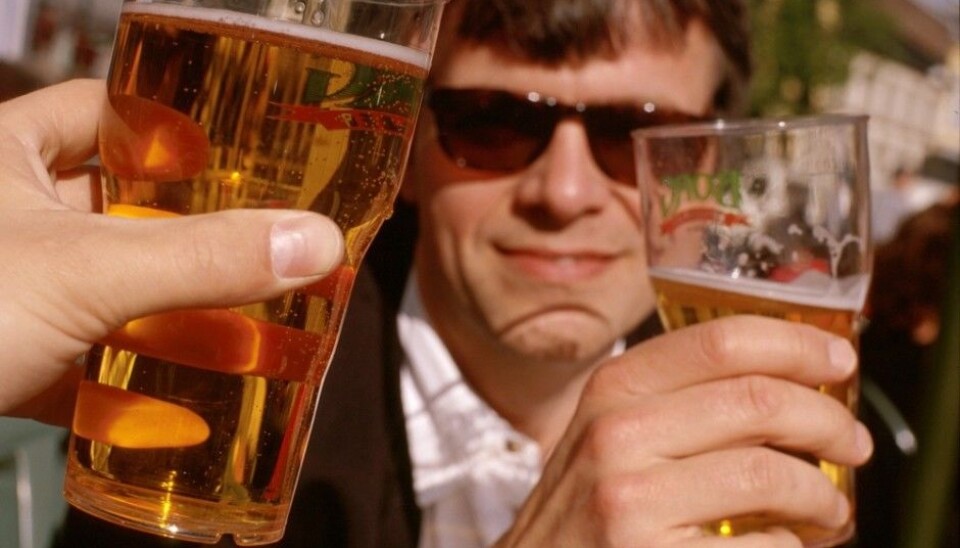
Do some people drink too much because of changes in the brain?
Scientists believe they have found a reason why some people find it impossible to resist the craving for alcohol. “This finding may be a solid piece in a huge puzzle,” says a Norwegian researcher.
You've been at a mid-day meeting and you have to head back at work. On the walk back to the office you pass some outdoor restaurants where people are sitting and drinking beer and wine. The weather is fine and you think to yourself: Boy, it sure would be nice to have something to drink.
Most of us just walk past and think: It would have been nice, but I’m supposed to go back to work, so I can’t have a drink now.
An alcoholic can’t do this. He or she thinks: It’s hot, and I’m thirsty. I’ll have a drink.
So why is it that some people are unable to control this urge?
Drunken rats
Scientists have long suspected that alcoholics have some kind of damage in the brain's frontal lobe, which controls impulse control.
The biological mechanisms that may be to blame for this, however, have been unclear.
A research group at Linköping University in Sweden in collaboration with US researchers has found that the problem may be due to the lack of an enzyme in the brain’s frontal lobe. The research was conducted on rats.
This enzyme, which is called PRDM2, controls the activity of genes that are needed to send effective signals from cells to stop impulsivity.
When researchers allowed rats to drink alcohol regularly, this enzyme was knocked out and the rats’ impulse control disappeared altogether. When they knocked out the enzyme in test animals that had not been drinking regularly, those animals also lost their impulse control.
Explains relapse after many years
It turns out that this enzyme is gradually down-regulated when the brain has experienced many drunk-to-sober cycles. Once the enzyme is turned off, the researchers believe that the effect lasts a lifetime.
This may explain why alcoholics can relapse after many years of abstinence. Their impulse control, relative to the desire to drink, is gone forever.
A pill to treat alcohol cravings?
One of the researchers behind the study, psychiatrist and addiction researcher Markus Heilig, believes that this may be a small step towards developing new drugs to treat alcoholism. But this type of treatment lies far in the future, he admits. And even if the research doesn’t end up leading to treatment, the finding is still important, he told Accent magazine.
He believes that this shows there is good reason to speak up when someone drinks a lot of alcohol. If you drink enough alcohol over a long enough period, the damage will occur.
“A surprising study”
Espen Walderhaug is research coordinator for the Adult Addiction Treatment Section at Oslo University Hospital. He has conducted research in areas similar to the research done by the Swedish and American scientists, but isn't familiar with the scientists behind this study.
“I found this to be both surprising and revolutionary research. The researchers have set themselves up to find a causal mechanism behind addiction. This is in many ways a holy grail for scientists who study addiction and substance abuse,” he said.
He believes that the design of the study is sound.
“There is strong evidence here. The researchers conducted two experiments simultaneously. One was on rats given a lot of alcohol, which then developed alcohol-dependent behaviour and had less of this enzyme. The second experiment was where the researchers removed much of the enzyme in the animals, which then went on to develop alcohol-dependent behaviour,” he said.
Rats research applicable to humans
Walderhaug wonders, however, whether the research findings are applicable to humans.
The advantage of rats is that researchers can dissect them. It is not possible to do the same sort of study on living human beings, of course, but it might be possible to look for the enzyme in human cadavers donated for research, he said.
“We have access to these research subjects’ brains,” he said. “It shouldn’t be impossible to look for this enzyme in their brains, if we can determine whether our research subjects have had a history of alcohol problems or not.”
Walderhaug also believes that researchers need to consider gender differences. His own research on impulsivity and serotonin levels shows that they are different depending on gender.
Walderhaug doubts that the results are the beginning of a cure for alcoholism.
However, he says, it is still worthwhile to increase our understanding of the mechanisms that are involved in addiction.
“This can be a solid piece in a huge puzzle. Alcohol disorders are a large and growing social problem for which we currently have no good medical solution,” he said.
--------------------------------------
Read the Norwegian version of this article at forskning.no
Translated by: Nancy Bazilchuk





